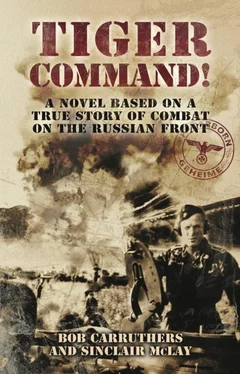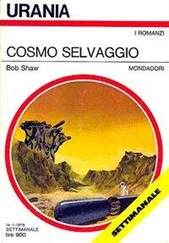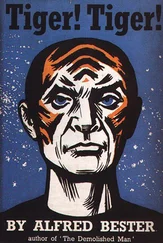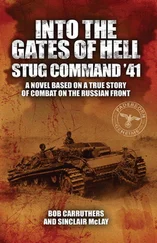“I hope you are right, Hans! And there is no better crew to show the world, and particularly Ivan, what this machine can do! Speaking of crews, how is your loader, Herr Wohl? Has he been adversely affected by events?”
“SS-Schütze Wohl reacted as he does. It was a visceral reaction, there is not a political bone in his body. All he saw was a favoured old teacher, he was not aware of any political changes his old teacher may have undergone, but I would be loath to lose him. In fact, I would go so far as to suggest that eventuality might fatally undermine our combat effectiveness… and on this matter, if I may, I would appreciate any discretion you could afford. You know how sometimes a man’s name can appear on a bit of paper, then another, then an investigation… It can take up valuable time.”
“Indeed. In fact, I shall make you a deal,” replied Kurt, slapping Hans heartily on the shoulder. “My recollection is already a bit vague, but if you make over fifty kills in Rostov in this new tank, I will completely wipe this entire incident from my memory!” Both men laughed nervously.
Hans said his goodbyes and left Kurt’s office. As he was walking out into the dim evening, he couldn’t help but remember the Danish art teacher. At first impression, he did not seem a bad sort. In fact, Otto had attested to his previous character, and there was still no absolute proof that he had in fact sabotaged the crane. But, if he had, what would drive a man to embark on such a hateful and reckless course of action?
*
Walter Lehmann was furious.
“Damn Bremer! If he hadn’t been so trigger-happy, he might just have been able to throw a spanner in the works. Maybe I should have sent someone a little less zealous, a little less than a true believer,” thought Walter Lehmann to himself.
But then people like Bremer provided excellent cover. Anyway, Bremer was dead now. Lehmann thought he’d better just leave it like that. No point in stirring things up. The less his fingerprints were found on any of these investigations the better. Fingerprints could be linked to patterns, and patterns to motives.
Walter Lehmann had been an active Soviet agent for over ten years now, and this was one of the secrets of his success. Remove yourself from the scene of the crime. He had sent Bremer to investigate Otto Wohl, but there had been no paperwork, until now. This would be the report.
“Bremer was acting on a tip-off about a communist art teacher who may have been selling information to the Russians. Bremer confronted him. The spy ran. Bremer shot him, and was then turned on by an angry criminal mob. Died a hero. Case closed.”
Time to move on…
Lehmann returned to shuffling through the day’s paperwork on his desk. Routine, routine, routine…. But then one report caught his eye. A Soviet agent in custody in the cells. Red Orchestra. Walter Lehmann’s mind started putting pieces together.
The walk from Prinz-Albert Strasse to the holding cells was pleasant, all the more so because Walter Lehmann took the time to sit in his favourite cafe, before buying a bottle of an expensive Asbach Uralt. Then, looking for all the world as if he was on a Sunday afternoon stroll, Walter Lehmann walked smartly into the corridor and asked one of the guards if he could possibly spend some time with Dieter Kleimer, in charge of the cell block. Making the visit look as accidental as he possibly could, of course…
“Kleimer! How are you, you old dog!” exclaimed Lehmann on meeting his old Gestapo colleague.
“Walter! The sun has just burst through the clouds! How the devil are you?” replied Kleimer.
“Just passing, on my way to Joseph and Anna’s◦– one of the children’s birthdays◦– had this fine bottle of brandy in my hands and thought you might want to share a glass!”
“Well, funny you should say that, because I have this box of excellent cigars liberated from a communist, and I was just wondering when on earth I was ever going to get a chance to acquaint myself with their glorious flavour,” replied Dieter Kleimer, pulling up a seat for his old friend and opening a cabinet which housed his favourite cigars.
The two men exchanged pleasantries, each asking about the other’s wives and children and sharing stories of old acquaintances, before Dieter Kleimer asked about Lehmann’s new position.
“We are doing good work, my old friend. Just yesterday we disrupted a Soviet spying operation at one of our largest engineering works. Unfortunately, we lost four men, but the value to the Reich is immeasurable.”
“Quite,” replied Kleimer admiringly.
“Most of these Soviet attempts at espionage are clumsy, as you would expect from such an inferior race, but there is one group who are proving a little more stubborn. This damn Red Orchestra. I don’t know if you have heard of them.”
“Funny you should mention that, my dear Walter. We may have one in our cells just now. In fact, I sent over a report this morning.”
“Well, I have not seen it… Damn secretaries!” said Lehmann, feigning anger.
“You hire your secretaries according to looks and not ability, my old friend!”
“Yes, that is something in need of a proper revision… but maybe not immediately!” laughed Lehmann. “So, who is this suspect?”
“Maria Himpel. She works as a secretary for a Swiss textile company. Our informant tells us that she may have links to the Rote Kapelle.”
“Interesting,” replied Lehmann, his demeanour taking on a more serious hue. “Has she revealed anything yet?”
“We are having trouble breaking her…” replied Kleimer.
“Give me five minutes,” said Lehmann, with more than a hint of menace, “but first, let me see her records.”
Soon after perusing her records, Walter Lehmann found himself alone in a cell with Maria Himpel.
The railhead at Kassel was a clanking bustle of tracks and marshalling yards. At this rate, they would have little chance to sleep before meeting up with the crews of the other four Tigers, loading, and heading back to Rostov. The new SSyms carriages were here on time, and the Tigers appeared ready to go.
“Change the tracks? Why the hell do we need to do that?” shouted Otto Wohl above the noisy din.
“They are too wide for transport by train,” replied Bobby Junge.
“Surely they should have thought of that before they built them! Do these designers never leave their stuffy little offices? Did they think we were to drive them to the front line?”
“Changing the tracks should only take twenty minutes… there are other procedures… but you’ve seen the size of this thing!”
“Hmmph… Elvira needs to go on a diet, if you ask me…” grumped Otto Wohl. “So, where are the transport tracks?”
“They were supposed to come direct from the factory…” said Junge.
The implication began to sink in.
“Look, can’t we just load with these?” said Wohl.
“No, not if you don’t want to be in a train crash!”
“Oh well,” said Wohl, taking out a cigarette. “Time for a break then.”
*
“She was prepared to talk,” said Lehmann to Kleimer, as they walked the long dark corridor back to the front gate. “Interesting intelligence. Apparently, there is a massive build-up of Red armour near Leningrad.”
“That was quite impressive in such a short time,” replied Kleimer. “What did you say to her?”
“Trade secret, Herr Kleimer… but you will call me next time you have a potential informant of the same type. Please send a full report◦– to me personally this time◦– when you have her statement.”
“Of course… and what shall we do with her?”
Читать дальше












